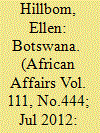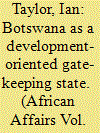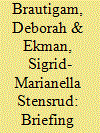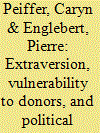|
|
|
Sort Order |
|
|
|
Items / Page
|
|
|
|
|
|
|
| Srl | Item |
| 1 |
ID:
115828


|
|
|
|
|
| Publication |
2012.
|
| Summary/Abstract |
I am delighted that my article 'Botswana: a development-oriented gate-keeping state' has instigated a debate with such a distinguished scholar as Ian Taylor. While post-independence Botswana is well known for economic growth, social development, and a maturing formal democracy, how we understand and interpret the drivers and substance of this success story has become increasingly controversial. I believe that instead of being content with Botswana's present achievements it is justifiable to ask: What is required for the country to erase poverty, develop its rural areas, achieve a diversified and sustainable economy and society, and become a high-income country characterized by modern economic growth, inclusive of social welfare and full political freedoms? It is in relation to such ambitions that it is imperative to understand the development potential of the existing state structure. I claim that with the present state structure there is significant risk that Botswana will stagnate rather than develop further, especially considering the possibility that the country will run out of profitable mineral deposits in the future and the militarization of politics that some argue is taking place under President Ian Khama.1 Given this, I argue that if the country is to continue and improve its development trajectory, structural change will be necessary. The facts of Botswana's post-1966 development have been presented in a rich body of literature and I do not believe that the controversy here is about the reliability of the facts. Instead, it is the interpretation of them and what inferences are to be drawn from them that is being discussed. This is far from a simple exercise in the sense that Botswana may not be a clear-cut case of any state model. Even Taylor himself writes that 'Botswana is an example of a state that has pursued certain policies … [which have led] … what might be …
|
|
|
|
|
|
|
|
|
|
|
|
|
|
|
|
| 2 |
ID:
115827


|
|
|
|
|
| Publication |
2012.
|
| Summary/Abstract |
Ellen Hillbom's contribution to the debate on the nature of the state in Botswana is most welcome.1 The relative success, despite important qualifiers, of Gaborone stands in stark contrast to many of its neighbours. Explaining this is important for studies of comparative African development. However, I disagree with Hillbom's negation of Botswana as a developmental state and her characterization of it as a gate-keeping state. Instead, I would argue that Botswana is an example of a state that has broadly pursued certain policies in the construction of a formative hegemony, to use Antonio Gramsci's concept.2 Doing so has led to what might be regarded as a developmental state to emerge - a state that pursues policies that coordinate investment plans; has a national development vision (implying that the state is an entrepreneurial agent); engages in institution building to promote growth and development; and, finally, plays a role in domestic conflict management.3 A key theorist of the developmental state, T. J. Pempel, indeed argues that 'These fusions of state and society are reflected in specific public policy profiles akin to what Antonio Gramsci called "hegemonic projects".'4
Six major components define the developmental state model: a determined developmental elite; relative autonomy; a powerful, competent and insulated bureaucracy; a weak and subordinated civil society; the effective management of non-state economic interests; and legitimacy and performance.5 Botswana's state since independence conforms to such indicators, managed by the Botswana Democrtaic Party (BDP).6 Its authoritarian nature alongside such features of its political economy is in keeping with 'typical' developmental states.7
|
|
|
|
|
|
|
|
|
|
|
|
|
|
|
|
| 3 |
ID:
115829


|
|
|
|
|
| Publication |
2012.
|
| Summary/Abstract |
FOREIGN INTEREST IN LARGE LAND ACQUISITIONS IN AFRICA began to hit the headlines in 2007 and 2008. China, a net food importer since 2004, was seen as one of the chief players in this rush for land. Mozambique has often been cited in support of the widespread conclusion that the Chinese government is directly seeking land in Africa for China's own food security.1 This briefing shows that the much-circulated picture of Chinese agricultural activities in Mozambique is closer to fiction than fact. That the conventional wisdom on Mozambique can be so far from reality calls into question the picture in other African countries as well.
Worries about the developmental impact of large-scale land investment are well-founded. Large land transfers are bound to raise alarms, and more so if the land is communally owned or occupied by subsistence farmers, or in a food-deficit region. Furthermore, many believe that Chinese companies will not simply invest in a search for profit, but will act primarily to advance Beijing's national security goals.2 Chinese foreign investment in land evokes fears of loss of national control, hence the parallels that are frequently drawn with neo-colonialism.
|
|
|
|
|
|
|
|
|
|
|
|
|
|
|
|
| 4 |
ID:
115826


|
|
|
|
|
| Publication |
2012.
|
| Summary/Abstract |
This article explores political mobilization, legitimacy, and identity in the Angolan Central Highlands from the anti-colonial struggle of the 1960s until the end of the civil war in 2002. It examines how the rival movements, MPLA and UNITA, competed for support, and considers the nature of the relationships between political-military elites and the Angolan people. Whereas much scholarship on civil war has focused on the emergence of rebellions against the state, I argue that such an approach to the Angolan war is inappropriate since both protagonists were founded as anti-colonial movements and both organizations developed characteristics of states to different degrees. Central to each party's narrative was an ideology of the state as a complex of ideas and practices that linked together responsibilities towards the population, prerogatives of violence, and the identity of the nation. People expressed support for either or both movements in terms of common interest and identity, which in turn were shaped by the political education of the movement in control at the time.
|
|
|
|
|
|
|
|
|
|
|
|
|
|
|
|
| 5 |
ID:
115823


|
|
|
|
|
| Publication |
2012.
|
| Summary/Abstract |
Academic debate on Rwanda has significant thematic gaps, and does not usually make use of a theoretically informed comparative framework. This article addresses one thematic gap - the distinctive approach of the RPF-led regime to political involvement in the private sector of the economy. It does so using the framework of a cross-national study which aims to distinguish between more and less developmental forms of neo-patrimonial politics. The article analyses the RPF's private business operations centred on the holding company known successively as Tri-Star Investments and Crystal Ventures Ltd. These operations are shown to involve the kind of centralized generation and management of economic rents that has distinguished the more developmental regimes of Asia and Africa. The operations of the military investment company Horizon and of the public-private consortium Rwanda Investment Group may be seen in a similar light. With some qualifications, we conclude that Rwanda should be seen as a developmental patrimonial state.
|
|
|
|
|
|
|
|
|
|
|
|
|
|
|
|
| 6 |
ID:
115822


|
|
|
|
|
| Publication |
2012.
|
| Summary/Abstract |
In seeking to maintain their power, many African regimes rely on strategies of extraversion, converting their dependent relations with the external world into domestic resources and authority. This article assesses the relationship between extraversion and political liberalization, a dimension of African democratization that has been somewhat underappreciated in recent empirical studies. African countries vary in their extraversion portfolios, or the dimensions of their relations to the outside world that they can instrumentalize, and these variations correspond both to different degrees of vulnerability to the demands of foreign donors and to different preferences from the donors themselves. We find four quantitative measures of extraversion vulnerability to be statistically associated with the initial transitions of the 1989-1995 period and with the 'consolidations' at different levels of democracy observable between 1995 and 2011. These findings shed new light on both democratic and hybrid regime trajectories in Africa.
|
|
|
|
|
|
|
|
|
|
|
|
|
|
|
|
| 7 |
ID:
115825


|
|
|
|
|
| Publication |
2012.
|
| Summary/Abstract |
Modern Nigerian poetry in English has proved to be a significant medium of action against authoritarian leadership in Nigeria. In historicizing the socio-political condition of regimes, Nigerian poets have responded to circumstances distinct to their historical period. This article examines the work of the younger writers widely regarded as the third generation of Nigerian poets, the condition of its production, and its 'generational' response to the dictatorships of General Ibrahim Badamosi Babangida (1985-93) and the late General Sani Abacha (1993-8). The article argues that while older Nigerian poets also responded to the intense oppression caused by these regimes, the third generation poets represent one of the prominent counter-hegemonic cultural practices in the decade between the 1980s and the 1990s. United by a collective spirit, they raise a generational, coherent counter-hegemonic discourse against these regimes, despite the difficulties they had to face. The article is an attempt to map out this new, relatively unknown poetry and what might be called its aesthetics of rage.
|
|
|
|
|
|
|
|
|
|
|
|
|
|
|
|
| 8 |
ID:
115824


|
|
|
|
|
| Publication |
2012.
|
| Summary/Abstract |
This article explores Uganda's decision to send peacekeeping troops to Somalia in 2007 as part of the African Union Mission in Somalia (AMISOM) and argues that the intervention has as much to do with Uganda's relationship with its donors as it has with maintaining regional stability - the official justification for intervention. Museveni's decision to intervene in Somalia is the most recent example of his regime's multi-pronged 'image management' strategy in which the President has involved Uganda in numerous foreign and domestic activities to ensure that donors perceive his government in a particular way vis-à-vis their interests: as an economic success story, a guarantor of regional stability, or, in relation to Somalia, an ally in the global war on terror. In so doing Museveni's strategy, conceptualized here within a constructivist framework, has been able largely to avoid censure in areas of traditional donor concern such as governance, thereby achieving a considerable degree of agency in a seemingly asymmetric relationship.
|
|
|
|
|
|
|
|
|
|
|
|
|
|
|
|
|
|
|
|
|